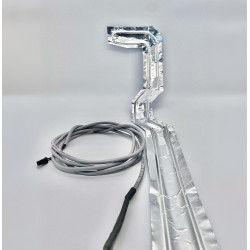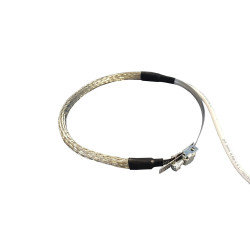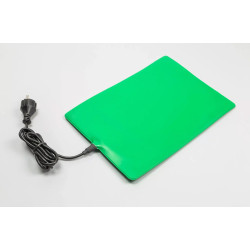-
BackX
-
Components
-
-
Category
-
Semiconductors
- Diodes
- Thyristors
-
Electro-insulated Modules
- Electro-insulated Modules | VISHAY (IR)
- Electro-insulated Modules | INFINEON (EUPEC)
- Electro-insulated Modules | Semikron
- Electro-insulated Modules | POWEREX
- Electro-insulated Modules | IXYS
- Electro-insulated Modules | POSEICO
- Electro-insulated Modules | ABB
- Electro-insulated Modules | TECHSEM
- Go to the subcategory
- Bridge Rectifiers
-
Transistors
- Transistors | GeneSiC
- SiC MOSFET Modules | Mitsubishi
- SiC MOSFET Modules | STARPOWER
- Module SiC MOSFET ABB’s
- IGBT Modules | MITSUBISHI
- Transistor Modules | MITSUBISHI
- MOSFET Modules | MITSUBISHI
- Transistor Modules | ABB
- IGBT Modules | POWEREX
- IGBT Modules | INFINEON (EUPEC)
- Silicon Carbide (SiC) semiconductor elements
- Go to the subcategory
- Gate Drivers
- Power Blocks
- Go to the subcategory
- Electrical Transducers
-
Passive components (capacitors, resistors, fuses, filters)
- Resistors
-
Fuses
- Miniature Fuses for electronic circuits - ABC & AGC Series
- Tubular Fast-acting Fuses
- Time-delay Fuse Links with GL/GG & AM characteristics
- Ultrafast Fuse Links
- Fast-acting Fuses (British & American standard)
- Fast-acting Fuses (European standard)
- Traction Fuses
- High-voltage Fuse Links
- Go to the subcategory
- Capacitors
- EMI Filters
- Supercapacitors
- Power surge protection
- TEMPEST emission revealing filters
- Surge arrester
- Go to the subcategory
-
Relays and Contactors
- Relays and Contactors - Theory
- 3-Phase AC Semiconductor Relays
- DC Semiconductor Relays
- Controllers, Control Systems and Accessories
- Soft Starters and Reversible Relays
- Electromechanical Relays
- Contactors
- Rotary Switches
-
Single-Phase AC Semiconductor Relays
- AC ONE PHASE RELAYS 1 series| D2425 | D2450
- One phase semiconductor AC relays CWA and CWD series
- One phase semiconductor AC relays CMRA and CMRD series
- One phase semiconductor AC relays - PS series
- Double and quadruple semiconductor AC relays - D24 D, TD24 Q, H12D48 D series
- One phase semiconductor relays - gn series
- Ckr series single phase solid state relays
- One phase AC semiconductor relays for DIN bus - ERDA I ERAA series
- 150A AC single phase relays
- Rail Mountable Solid State Relays With Integrated Heat Sink - ENDA, ERDA1 / ERAA1 series
- Go to the subcategory
- Single-Phase AC Semiconductor Relays for PCBs
- Interface Relays
- Go to the subcategory
- Cores and Other Inductive Components
- Heatsinks, Varistors, Thermal Protection
- Fans
- Air Conditioning, Accessories for Electrical Cabinets, Coolers
-
Batteries, Chargers, Buffer Power Supplies and Inverters
- Batteries, Chargers - Theoretical Description
- Modular Li-ion Battery Building Blocks, Custom Batteries, BMS
- Batteries
- Battery Chargers and Accessories
- Uninterruptible Power Supply and Buffer Power Supplies
- Inverters and Photovoltaic Equipments
- Energy storage
- Fuel cells
- Lithium-ion batteries
- Go to the subcategory
-
Automatics
- Spiralift Lifts
- Futaba Drone Parts
- Limit Switches, Microswitches
- Sensors, Transducers
-
Infrared Thermometers (Pyrometers)
- IR-TE Series - Water-proof Palm-sized Radiation Thermometer
- IR-TA Series - Handheld Type Radiation Thermometer
- IR-H Series - Handheld Type Radiation Thermometer
- IR-BA Series - High-speed Compact Radiation Thermometer
- IR-FA Series - Fiber Optic Radiation Thermometer
- IR-BZ Series - Compact Infrared Thermometers
- Go to the subcategory
- Counters, Time Relays, Panel Meters
- Industrial Protection Devices
- Light and Sound Signalling
- Thermographic Camera
- LED Displays
- Control Equipments
- Go to the subcategory
-
Cables, Litz wires, Conduits, Flexible connections
- Wires
- Cable feedthroughs and couplers
- Litz wires
- Cables for extreme applications
- Sleevings
-
Braids
- Flat Braids
- Round Braids
- Very Flexible Flat Braids
- Very Flexible Round Braids
- Cylindrical Cooper Braids
- Cylindrical Cooper Braids and Sleevings
- Flexible Earthing Connections
- PCV Insulated Copper Braids (temp. up to 85C)
- Flat Aluminium Braids
- Junction Set - Braids and Tubes
- Steel Braids
- Go to the subcategory
- Traction Equipment
- Cable Terminals
- Flexible Insulated Busbars
- Flexible Multilayer Busbars
- Cable Duct Systems
- Go to the subcategory
- View all categories
-
Semiconductors
-
-
- Suppliers
-
Applications
- CNC Machine Tools
- DC and AC Drives (Inverters)
- Energetics
- Energy bank
- Equipment and Components for Hazardous Areas [Ex]
- Equipment for Distribution, Control and Telecommunications Cabinets
- HVAC Automation
- Induction Heating
- Industrial Automation
- Industrial Protective Devices
- Machines for Drying and Wood Processing
- Machines for Thermoforming Plastics
- Mining, Metallurgy and Foundry
- Motors and Transformers
- Power Supplies (UPS) and Rectifier Systems
- Printing
- Temperature Measurement and Regulation
- Test and Laboratory Measurements
- Tram and Railway Traction
- Welding Machines
-
Assembly
-
-
Inductors
-
-
Induction devices
-
-
Service
-
- Contact
- Zobacz wszystkie kategorie
Special Heaters
What are special heaters?
Special heaters are components and complete heating modules adapted for unusual applications. They differ from standard universal heaters in that they are designed with consideration for the shape of the element, the type of medium, temperature...
What are special heaters?
Special heaters are components and complete heating modules adapted for...
| Image | View the product | No. Manufacturer | ||||
|---|---|---|---|---|---|---|
| picture_as_pdf |

|
ALPER | Alper-009 aluminum foil warmers | SEE IT | Alper-009 | On Order |
| picture_as_pdf |

|
ALPER | Alper-010 Heated Clamps | SEE IT | Alper-010 | On Order |
| picture_as_pdf |

|
ALPER | Alper-011 PVC IP67 heating mats | SEE IT | Alper-011 | On Order |
| picture_as_pdf |
|
ALPER | Alper-012 foil etched silicone heaters | SEE IT | Alper-012 | On Order |
What are special heaters?
Special heaters are components and complete heating modules adapted for unusual applications. They differ from standard universal heaters in that they are designed with consideration for the shape of the element, the type of medium, temperature requirements, and environmental conditions (e.g., hazardous areas, contact with chemicals, high humidity). Typical realizations include: band and strip heaters, insulated jackets, heating mats for substrates, cartridge heaters, ceramic elements, and modular solutions mounted on unusual surfaces.
Main types of special heaters
Band and strip heaters
Flexible bands quickly heat the walls of cylindrical tanks, pipes, or machine elements. Special versions are made of materials resistant to oils, chemicals, or high temperatures, and feature additional covers and connections adapted for industrial installations.
Insulated heating jackets and jackets
Jackets provide uniform surface heating and reduce heat loss thanks to integral insulation. They are used where process stability and energy efficiency are important — e.g., for heating tanks, molds, glands, or special process containers.
Heating mats and plates
Heating mats are easy to adapt to flat or slightly curved surfaces. They are used for heating workstations, mounting plates, heating tables, and technological floors, where controlled temperature distribution is required.
Cartridge heaters and modular high-temperature elements
Cartridge heaters are used in cylindrical holes and provide a fast, localized heat source. Special versions can be made with resistant covers, internal temperature sensors, or dedicated connectors for simple installation in the production line.
Dedicated and custom-made solutions
In many applications, "tailor-made" heaters are necessary — in terms of geometry, power, mounting method, and integration with the measurement system (thermocouples, PT100 sensors, controllers). Manufacturers offer versions made of special materials (e.g., corrosion-resistant alloys, silicone, PTFE) and with certificates allowing use in Ex zones.
Applications of special heaters
Special heaters are used where standard heating elements fail: in the chemical industry (reactive or viscous media), pharmacy (precise temperature control), food industry (consistency maintenance), accelerating injection and molding processes, heating measuring equipment, and in laboratory and research applications.
How to choose the right special heater?
Choosing the right solution requires analyzing several key parameters:
- Type and properties of the medium — viscosity, thermal conductivity, chemical compatibility of materials.
- Element geometry — contact surface, mounting access, shape of holes.
- Power and power density — how many watts are needed per unit area to achieve the required heating rate.
- Temperature range and accuracy — is precise regulation (±0.1°C) or only maintaining an approximate temperature needed.
- Control method — thermostats, PID controllers, thermal protection, integration with the PLC system.
- Environmental conditions — humidity, exposure to chemicals, Ex/ATEX zones.
- Safety and certificates — declarations of conformity, IP rating, mechanical resistance.
Advantages of investing in special heaters
- Process optimization — faster achievement of process temperature and parameter stability.
- Energy savings — better insulation and precise control can reduce electricity consumption.
- Extended production line life — fewer downtimes caused by material temperature problems.
- Process safety — dedicated safeguards and compliance with standards.
FAQ — frequently asked questions
What distinguishes a special heater from a standard one?
A special heater is designed for specific application conditions and requirements: shape, medium, temperature, and safety requirements. Standard heaters are universal and will not always meet the specific needs of the process.
Can a heater be adapted for an Ex zone?
Yes — there are versions intended for explosive atmospheres with appropriate certificates. However, it is necessary to confirm compliance and installation conditions with a safety specialist.
What parameters should be prepared before requesting a quote?
Prepare information about: dimensions of the element to be heated, desired temperature and heating time, type of medium, mounting conditions, and requirements for control and safeguards.
Summary
Special heaters are a key element in optimizing many industrial processes. By matching the shape, power, and control method, you can achieve greater efficiency, lower energy consumption, and better production repeatability. Before purchasing, consult the technical requirements and ask for samples or assembly drawings from the supplier.



